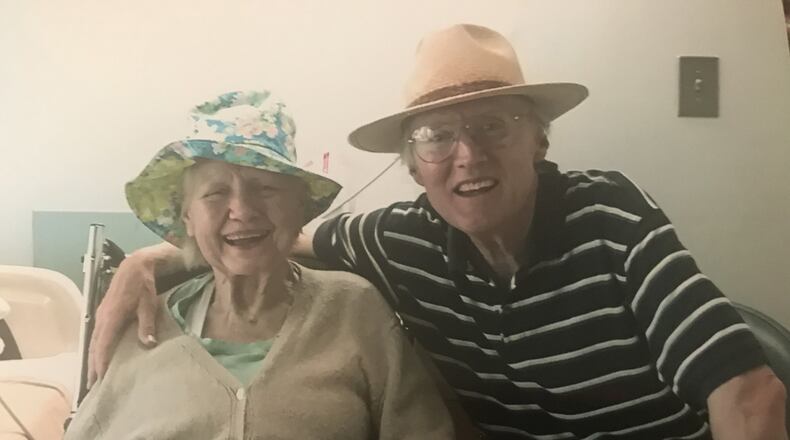Colette Harben is 89 and can’t speak, so she relies heavily on her family for care and comfort as they visit her each day at Northside Gwinnett Extended Care Center in Lawrenceville.
That has been their routine these past six years. But on Thursday her son and daughter were on a daily visit when the nursing staff told them they had to leave. There was no time to discuss how the care the family provides each day would be covered. The facility was swiftly implementing a strict no-visitor policy to combat concerns over the coronavirus.
The Harben family now feels cut off, and they are worried about their mother.
“It’s devastating,” said Steve Harben, who would spend most days with his mother at the facility, playing music, sitting in the courtyard and wheeling her through the halls. “After being able to assist her every day and now to be completely in the dark about how she’s doing. They didn’t tell us how long this is going to be in effect.”
With the frail elderly at high risk from the coronavirus, many of Georgia's long-term care facilities have imposed new restrictions on visitors and screenings for staff, and some adult day centers have temporarily closed. The facilities carry a dual burden of shielding residents from a potentially deadly pandemic while also trying to keep their facilities fully staffed, at a time when school closures are forcing some caregivers to stay home with small children.
“The particular vulnerability of our extended care residents requires very strict measures to protect them, and we have instituted them for as long as they are necessary,” said Lee Echols, a Northside spokesman. “We will work with family members to understand these measures and why they are so important.”
No positive cases in a skilled nursing facility or assisted living home in Georgia have yet to be reported, said Tony Marshall, president and CEO of the Georgia Health Care Association, which represents skilled nursing facilities and assisted living communities. He said some residents were tested for the virus in the last week and tests came back negative.
But given the high risk for vulnerable seniors, the facilities caring for elderly residents want to avoid the kind of COVID-19 outbreak that swept through a nursing home in Washington state, causing deaths and hospitalizations of patients and leaving about a third of the facility's staff with symptoms.
“The best means of ensuring the safety of our residents is to prevent the introduction of the virus,” Marshall said.
Both the U.S. Centers for Medicare & Medicaid Services (CMS) and the national association for the long-term care industry have issued updated recommendations in recent days, calling on nursing homes and assisted living communities to restrict visitors.
CMS administrator Seema Verma said during a press conference Friday with President Trump that the agency will be issuing even stricter limits on visits to nursing homes. “We are doing what we must to protect our vulnerable elderly,” she said.
Many providers are taking direction from professional organizations and government agencies and sharing information among one another on how to manage the challenges ahead, said Ginny Helms, president/CEO of LeadingAge Georgia, which represents non-profit senior care facilities.
The situation is evolving rapidly as providers make day-by-day calls on how to best protect their populations. Two adult daycares who are LeadingAge members announced on Friday they are temporarily closing in order to protect seniors. The issue of how to manage visitors is a big decision all facilities are facing, she said.
“We know restricting visitors is going to help cut down on exposure,” Helms said.
Facilities are also screening staff members in hopes of keeping their facilities free of the virus. At the same time, on Friday they were facing a new staffing challenge as widespread school closures forced some front-line workers to stay at home with young children instead of reporting to work to care for elderly residents.
“When you have school closures and your employees can’t come to work — we’re facing a significant challenge right now,” said Marshall.
The Georgia Senior Living Association, which represents assisted living communities and personal care homes, said its members are restricting visitors to cases involving end-of-life treatment or when a visitor is essential for a resident’s emotional or physical well-being. Anyone who does enter a facility, including staff, is screened for health history and has their temperature taken. Access by vendors is limited.
The question is how far facilities should go with the restrictions.
Melanie McNeil, Georgia’s long-term care ombudsman, whose office advocates for residents, said she expected facilities to take reasonable precautions which may include limiting visitors. But she said it’s important for facilities to find ways for residents to say in touch with family members while also allowing flexibility when it comes to in-person visits.
“If there’s a situation where it’s important for the family member to visit, we’re going to advocate for that,” she said.
A.G. Rhodes, a non-profit nursing home provider with three locations in metro Atlanta, informed its residents’ families this week that it was restricting visitors. CEO Deke Cateau said it was a difficult decision. “We said to ourselves, literally, what would we want for our mom or our dad,” Cateau said.
To keep families safely connected, he said the homes would use Skype and other communication platforms.
In another measure to protect patients from the virus, before essential staff can enter the building, each person is screened for any risks and their temperature is taken.
The average A.G. Rhodes resident is over age 80, which is the most high-risk group.
“Our job is, as best as possible, to keep them healthy and safe,” he said. “Most of our families and staff have been very understanding.”
At Wesley Woods Senior Living, a network of 10 assisted living and independent living facilities across Georgia, residents for the most part have been receptive to the screenings and restricted access of visitors, said Terry Bancroft, president/CEO of the non-profit.
“They are following the same news we are,” Bancroft said. “They feel good that we are protecting them in that way.”
She sees continued tightening of controls on access to the buildings if the virus continues to spread across the state to the point where it could be essential personnel only.
“This is going to be a day-by-day change,” she said. “Tomorrow, depending on what we learn, we could be doing it that quickly.”
Q&A on assisted living restrictions
The Georgia Senior Living Association, which represents assisted living communities and personal care homes in Georgia, said its members are instituting significant changes to protect residents from the coronavirus. Here are answers to frequently asked questions about the restrictions.
Q: Are visitors being allowed at all?
A: Our communities have instituted limited visiting hours. Only in certain situations, such as end-of-life treatment or when an individual is essential to a resident’s emotional and physical well-being and care, are outside visitors allowed in the community. Plus, outside visitation protocol prohibits any person under the age of 16 years old to enter the community.
Q: What protocols are the homes using for those who do come inside?
A: Following CDC recommendations, all persons entering the community – including staff – are screened through the following process:
Each individual must complete a health questionnaire, detailing any potential signs, symptoms or recent known contact with the virus as well as any notable travel within the last 14 days. Each individual’s temperature is checked. If these first two steps are completed successfully and without any cause for concern, the individual’s hands are sanitized, and they are allowed to enter the community.
Q: How are deliveries handled?
A: Vendor and delivery personnel have limited access to the community and are required to enter via the front entrance, where they are met by a designated community staff member.
Q: What if someone needs medical care?
A: Our community owner and operators have had conversations with third-party healthcare providers, such as home health, rehabilitation and hospice agencies, to ensure each are following the appropriate safety protocols.
Q: How is the building secured?
A: All entrances to the community, expect for the front, are locked from the exterior, preventing any unscreened individuals from entering the premises.
Q: Are residents still involved in activities?
A: All off-premises activities, such as restaurant outings and shopping trips, have been cancelled until further notice. Only activities on community grounds are permitted.
Keep Reading
The Latest
Featured





